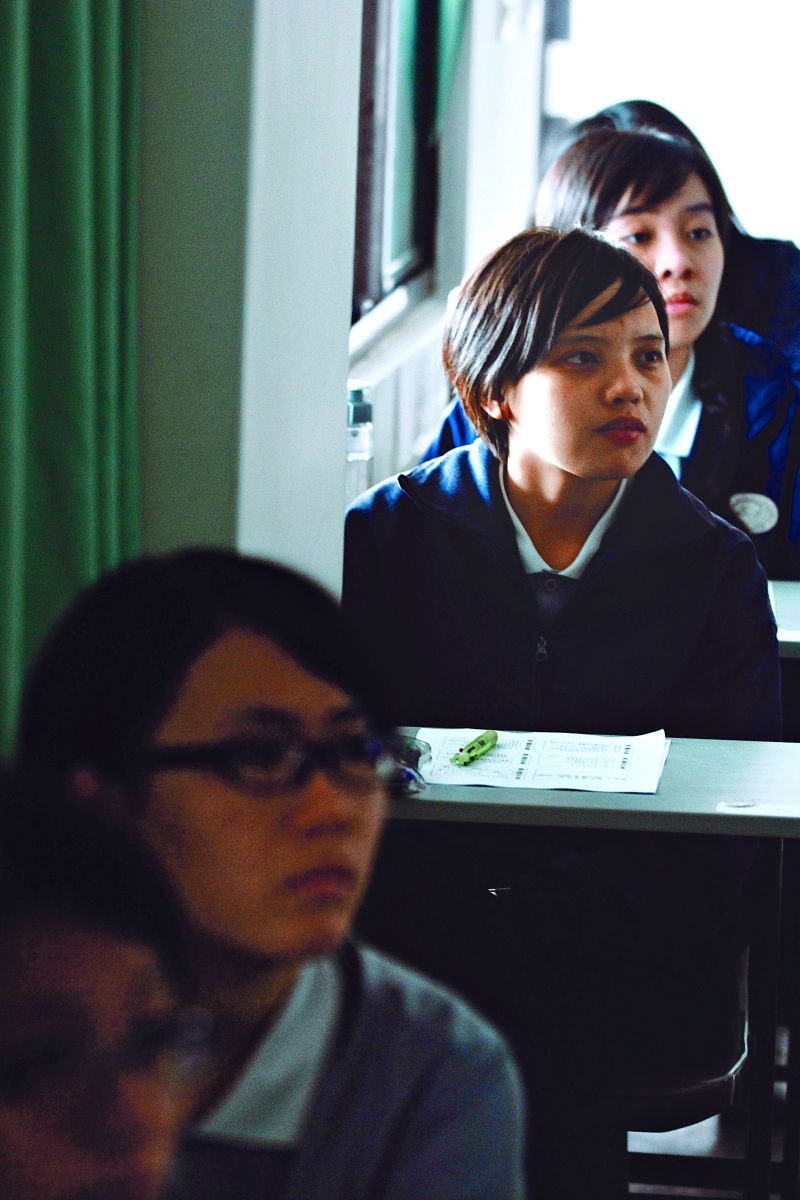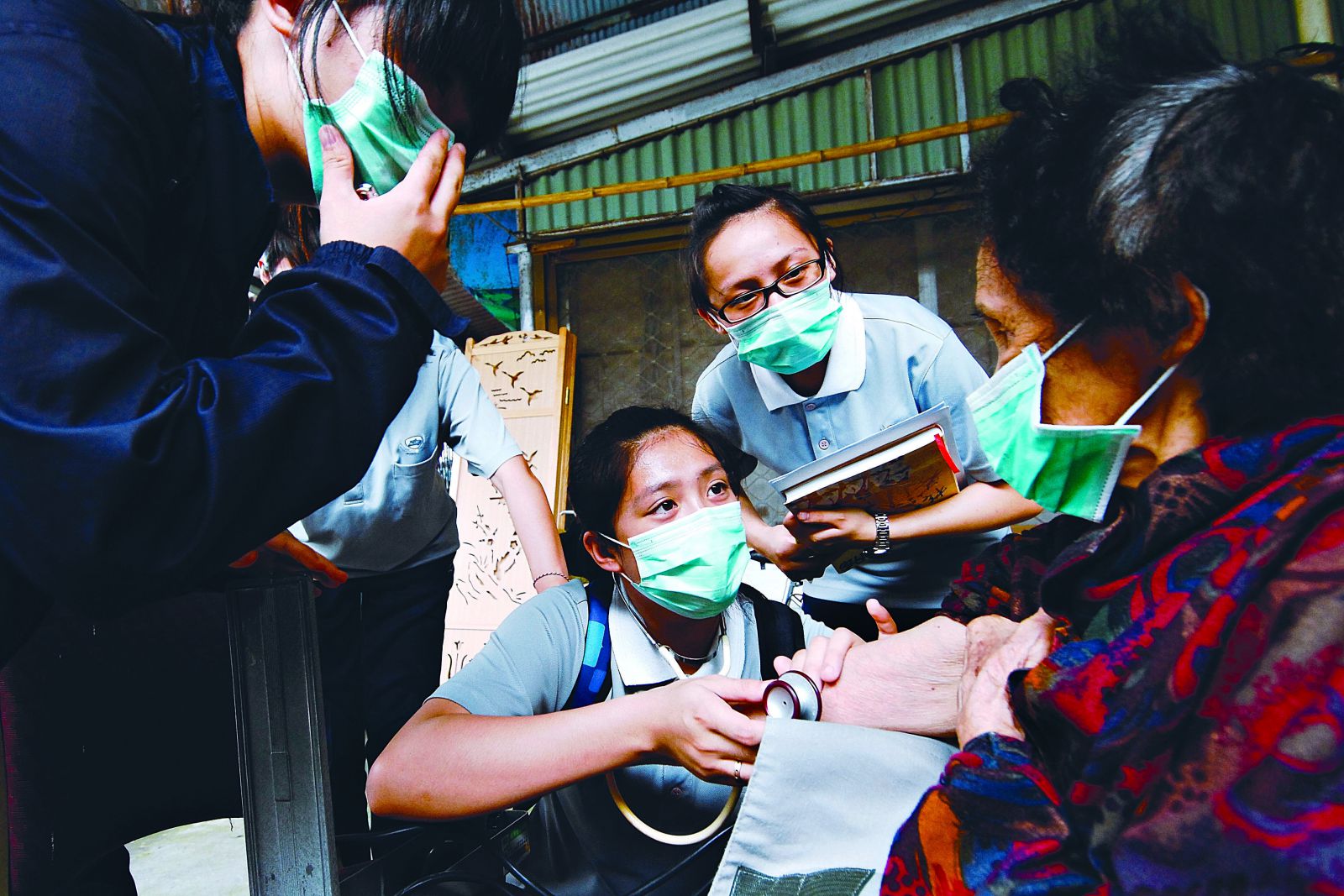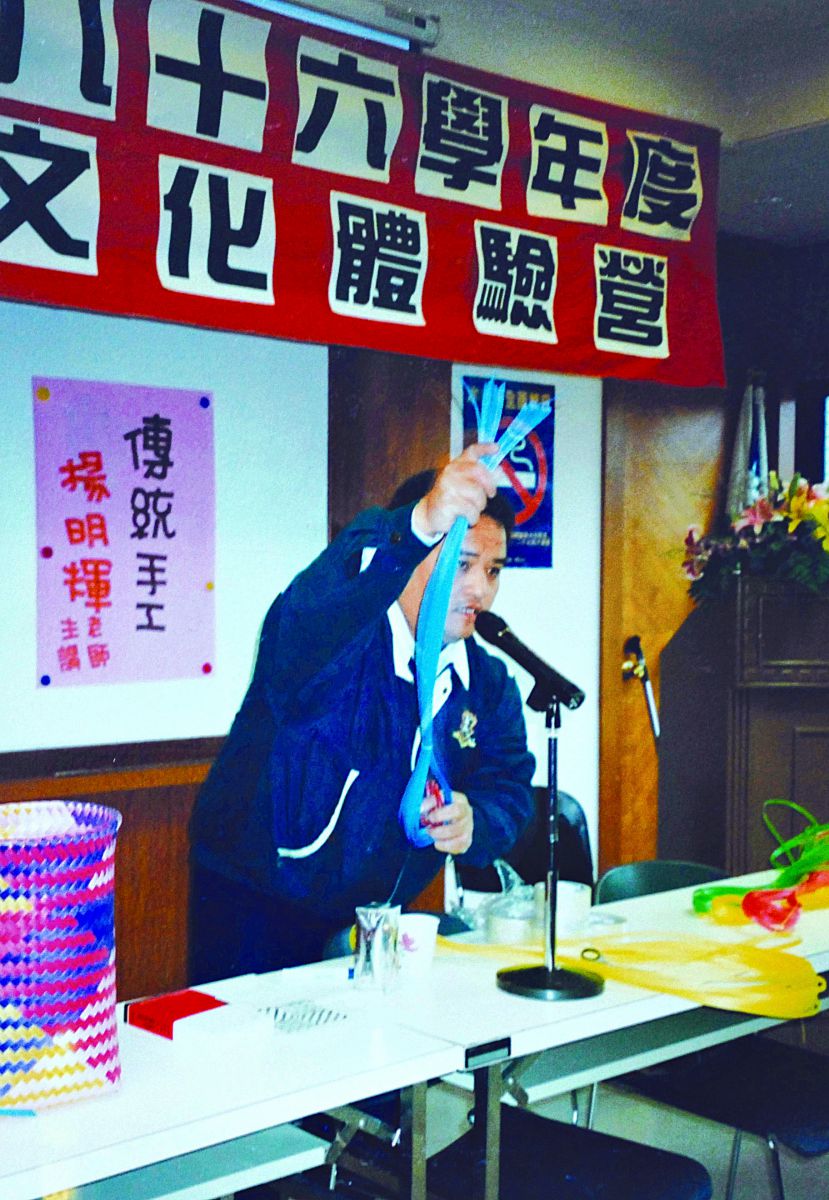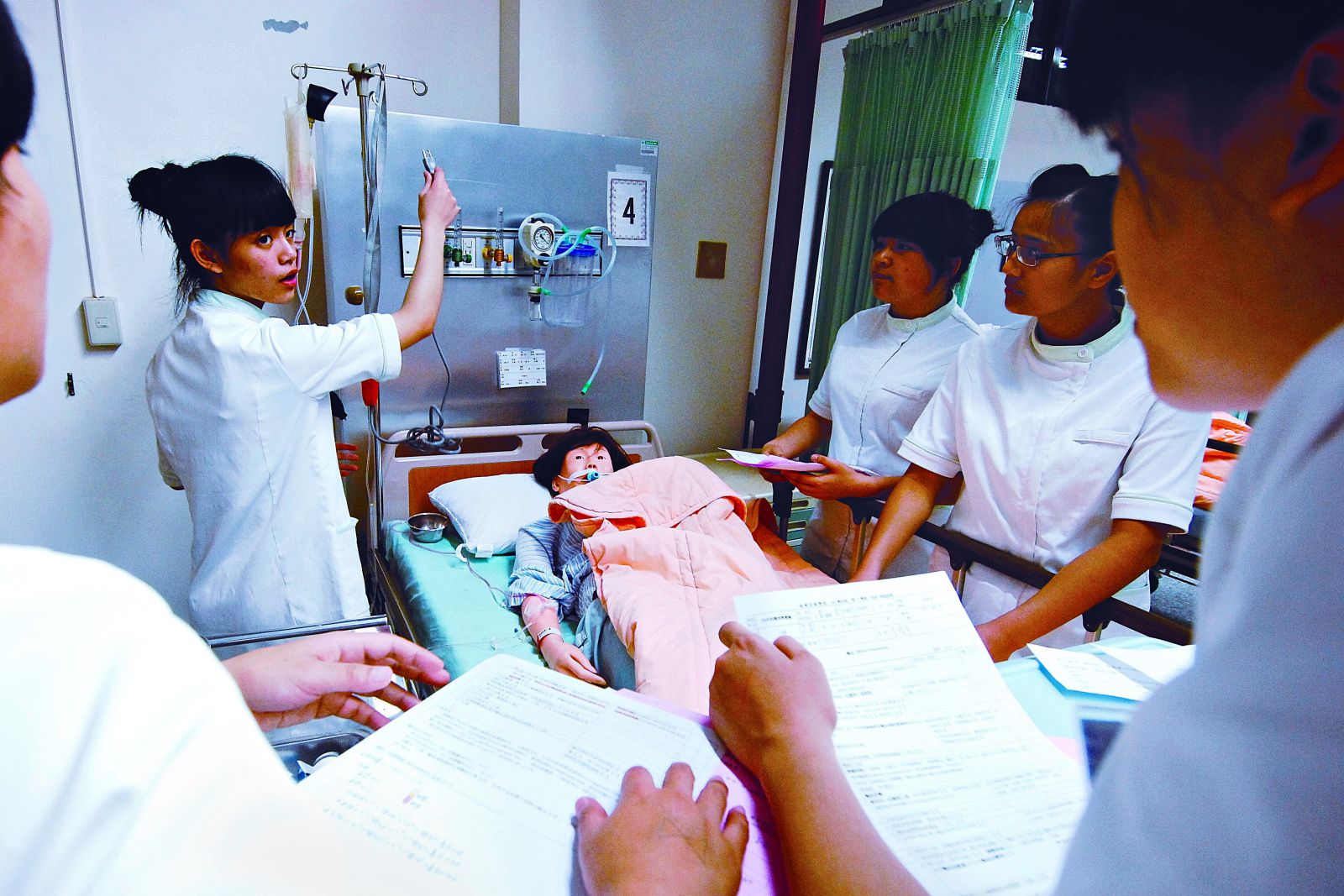

| A Chance for Needy Students | ||||||||||
| By Zheng Ya-ru Translated by Tang Yau-yang Photos by Yan Lin-zhao | ||||||||||
Other things being equal, aboriginal students in Taiwan perform as well as their mainstream counterparts. But the reality is that other things are gnerally not equal for the indigenous population. For example, they are often financially unable to afford a quality education. Tzu Chi offers a nursing program dedicated specifically to the indigenous population in Taiwan. The program levels the playing field by allowing aboriginal students to obtain a nursing education with no tuition or fees. More than 500 students have graduated from the program in the last 17 years. As a result, they have secured jobs and helped improve the finances of their families, forging a path that younger native people can also take for a solid life. In 1989, the Tzu Chi Junior College of Nursing (upgraded to the Tzu Chi College of Techno-logy in 1999) was established in Hualien, eastern Taiwan. In 1996, it inaugurated a program dedicated to serving indigenous students. Once admitted to this program, a student receives free tuition, fees, books, and room and board for five years, the length of time needed to complete the program. Each student also receives a little spending money each month from the program. Graduates earn a degree equivalent to an associate degree available from community colleges in the United States. In the nurturing environment provided by the Tzu Chi college, young students, like seeds in a fertile field, can concentrate on their studies, learn a trade, and get ready for a life of service and fulfillment.
Nowhere to turn In 2010, Zhong Ya-qin (鍾亞琴) was a senior at Xincheng Junior High School in Hualien. She is a member of the Taroko, one of the indigenous tribes in Taiwan. When her mother passed away, she was left with the responsibility for caring for her two younger sisters. It would have been a lot to lay on any young person’s shoulders, but to make life even more challenging for Zhong, her youngest sister suffered from cerebral palsy. Zhong was an excellent student. Her homeroom teacher, Chen Yong-zhi (陳勇志), helped her apply for scholarships and social assistance. The aid helped the three sisters scrape by, but it wasn’t enough to allow them to pursue further education, so Chen advised Zhong to aim for the Tzu Chi nursing program for native students. She followed his advice, and now she is approaching her fourth year in the five-year program. She is growing to like nursing, and she is carrying on with the comfort of knowing that she’s learning a trade that will provide her and her family with a decent living. She uses the monthly spending money given by the school to cover the living expenses of her younger sisters. One of her sisters, Ya-zhen (鍾亞珍), took the admission tests for the same program this year and has also been accepted. The two sisters will be schoolmates come the new semester. “I’m glad there’s this dedicated program. I don’t know what our future would be like if it had never been established,” Ya-qin said. “There are many indigenous students at our school,” said Chen, a 14-year veteran at Xincheng Junior High. “Some of them go to work right after graduation because they’re poor. Even some of those who go on to senior high school quit halfway through because they can’t afford it.” As soon as new students enter his school, he gets to know them better so that he can present them with further schooling choices that will best meet their interests and budgets. Lo Wen-jui (羅文瑞), president of the Tzu Chi College of Technology, pointed out that many junior high school teachers in Hualien and Taidong affirm the dedicated nursing program for aboriginals at his school. They encourage their indigenous students who have good grades but who come from impoverished families to take the admission exam to the dedicated program. “Teachers at schools such as Xincheng and Xiulin junior highs have helped their students prepare for our admission exam. They’ve even driven their students here to take the tests,” said Lo. He stressed that the indigenous students and mainstream students are now about the same in competence and capabilities. “As long as we give [the minority group] a nurturing environment and suitable resources, their performance can stand out too.”
An incubator Established 24 years ago, the Tzu Chi Junior College of Nursing aims to train nurses to care for local patients. An added benefit is that aboriginal students in the relatively undeveloped area of eastern Taiwan would have one more school near their homes where they can continue their education. Chen Shao-ming (陳邵明), a vice president of the Tzu Chi Foundation, explained that years ago, many aboriginal girls had to enter the work force right after they graduated from junior high school. They needed to help support their families, and they often went out of town to do that. “If they could stay at home to continue their schooling, they could be in a better position to reverse the adversity in their homes,” Chen said, referring to the improved earning power that more schooling could bring to these young people and, by extension, their families. Initially, the school received its students based on their scores on a joint entrance examination which was administered in highly developed northern Taiwan, where competition was fierce. Well-prepared candidates from northern Taiwan largely outscored aboriginals from eastern Taiwan. As a result, few indigenous students were admitted to the school. To help more indigenous students gain entrance, the college obtained permission from the Ministry of Education to establish a special program exclusively for 50 native students each year. This program, launched 17 years ago, does not rely on the results of the joint entrance exams. Instead, it administers its own admission tests to select its prospective students. “Once admitted, the students receive financial assistance from Tzu Chi,” Chen explained. “This frees them up to focus on learning a marketable skill.” Lin Yu-fang (林郁芳), who now works in a psychiatry unit at Yuli Veterans Hospital in Hualien, entered the program the first year it was instituted. “[When I started in the program] my family was in debt, and we often had to borrow money. If I had not been a beneficiary of the program, I would have had to give up my nursing dreams,” Lin recalled. Lin’s older sister also studied nursing, but at a school in Taipei where she also received financial aid. Lin compared the two schools: “Tzu Chi took really good care of us indigenous students. They waived our tuition and fees and gave us spending money. I even obtained scholarships, which helped support my family.” She went on to say that her sister chose to serve in emergency care after graduation. “As for me, while studying at Tzu Chi, my curricular and extracurricular activities often took me out to local communities [to care for needy or elderly people]. These visits kindled my interest in geriatric care.” It has been 12 years since she graduated from the nursing program. With both sisters working, their family finances have greatly improved. Lin contentedly summed up her present outlook: “My life is very stable now, and I love working in nursing. With a steady income, I can plan for my future.”
The program Lin is an example of the beneficial effects of the aboriginals-only nursing program. To extend those benefits to more young lives in need, the program was expanded in 2011 to a hundred new students per year, doubling the original size. Currently, there are close to 400 students in the program. Though for indigenous students only, the program is otherwise an integral part of the overall nursing program at the school. All students, indigenous or not, are mixed together in classes. Other than being indigenous, students in the dedicated program come from different backgrounds and for diverse reasons. Some are there for the financial aid at the expense of their interests. Others may be there because they experienced unexpected deaths in the family, and they want to learn to care for their loved ones still around them. Their abilities to learn may vary, too. “Some of our indigenous students fall behind because of distractions at home or because they’re working. We offer such students remedial classes on key subjects to help them catch up,” said department chair Professor Peng Shao-zhen (彭少貞). During the first two years of the program, students take courses on required subjects and elementary nursing. The next two years are for core nursing courses and brief internships. The first semester of the final year is for internships at local hospitals and communities, and the second semester is more schoolwork. Students learn much from their internships. Lin Shu-ting (林樹婷), of Dawu, Taidong County, shared a couple of experiences: “An elderly female patient suddenly took a turn for the worse. In the space of one day, she changed and deteriorated so much—in her looks and body shape—that I almost couldn’t recognize her. She was gone in just a few days.” Lin learned firsthand that life is fleeting and things can happen at any moment. Another time, she saw an old couple looking through a glass window at their newly delivered grandchild in the obstetrics ward. “On one side of the glass window was life that was fading away; on the other side a new life just beginning.” At that very moment, she felt intensely the ever-continuing cycle of life, death and rebirth. Lin Wen-xin (林雯馨), another beneficiary of the program, graduated about ten years ago. She now works at the respiratory care center at Mennonite Christian Hospital in Hualien. When she was in the program in 2000, she volunteered to intern at the newly opened Dalin Tzu Chi Hospital. “I knew that the population in the Dalin area was predominately Han Chinese, that I didn’t speak their dialect, and that my Austronesian ethnicity showed on my face. I kind of expected that I might feel out of my element, but nothing like that happened. Everyone was really warm to me.” She served conscientiously. She served her patients so well that one patient, before being discharged, thanked her with a key ring that was engraved with her name. “I was very touched. I felt that my first step in nursing had been reaffirmed and encouraged,” she said. Lin still has that key ring today, and she takes it out when she feels drained at work as a reminder of why she entered the nursing profession in the first place.
Recruiting The care and benefits the school provides for students in the program has attracted many—some from the same families. Lian Xin-ci (連欣慈), 20, graduated with the class of 2013. She now works at Hualien Tzu Chi Hospital. Her brother, Lian Xin-en (連欣恩), is studying in the program, too. There have been quite a few other siblings like them over the years—even twins! Recruiting for new students swings into high gear as graduation season nears. Recruiting used to be carried out in only six to eight schools in the Hualien area. The effort for this year, however, was expanded to include many more schools. The entire department faculty went on the road to visit over 20 junior high schools in the Hualien area to recruit students for the entire nursing department. They also visited schools near the six Tzu Chi hospitals around Taiwan. Besides giving its indigenous students excellent financial aid, the school also gives them an excellent education. It even offers a special course for students to prepare for the all-important nursing licensure examinations. Over the years, the students have done very well. For example, students last year achieved a pass rate of 76 percent, head and shoulders above the national rate of 41 percent. Tzu Chi has spent a lot of energy and resources on the aboriginals-only program. Since the inception of the program 17 years ago, the foundation has spent more than 200 million Taiwanese dollars (US$66 million) on close to 500 graduates. That is about NT$400,000 (US$13,300) for each graduate. With the resources spent on these students, it is heartening to see that graduates have fanned out and established themselves as upright people contributing to the well-being of society.
|
















|

.jpg)



